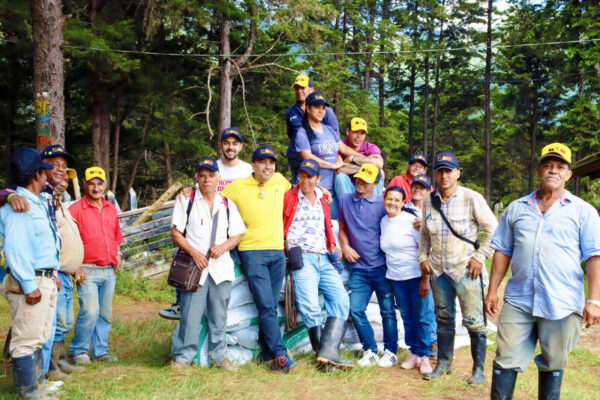Sponsored by Monday Properties and written by ARLnow, Startup Monday is a weekly column that profiles Arlington-based startups, founders, and other local technology news. Monday Properties is proudly featuring 1812 N. Moore Street in Rosslyn.
(Updated 3:15 p.m. on 11/9/21) Next to water, Americans probably drink coffee more than any other beverage — but they know very little about the brew, says Karel Leon, the co-founder of a Ballston-based coffee company.
He and his co-founder Javier LLano want to change that by selling better beans through their company, Black & Brown Coffee House (4075 Wilson Blvd). It has the ambitious goal of tackling commercial coffee’s alleged unhealthy physical side effects and unethical treatment of farmers and unsustainable practices, while giving back to D.C.’s poorest communities.
“When you have a product, any product, and you know your food is not ethical, it’s not sustainable, and it’s bad for health of consumer, I would quit that job,” he said. “Why would I do that?”
Disaffected by his job at World Bank Group, Karel — who grew up on a coffee farm in Colombia — wanted to do work that directly impacted people in poverty. He started Dignity Coffee in 2018, providing offices with coffee from growers in his hometown, and brought LLano on after.
But the pandemic hit and slashed Dignity’s profits by 90%, he said. Karel and LLano, who are Latino and Black, respectively, rebranded in the wake of 2020’s social justice movements to draw attention to the inequality in the commercial coffee industry and provide consumers with an alternative.

They decided to start where bad-quality coffee hits people the hardest: their stomachs.
“The most important thing for the consumers is to educate people about what ‘healthier black coffee means’ and why that matters,” Leon said.
Leon needed coffee at the office in order to remain alert, but it gave him indigestion, so he tried eating bagels and adding milk and sugar to quiet his stomach grumblings.
He realized he wasn’t alone. Moreover, he learned that the common side effects of diarrhea and acid reflux could be traced to where the coffee berries are grown and how they’re picked and processed.
Most commercial coffee berries are grown in flat areas in the constant sun. He said coffee trees ought to grow on the sides of tree-covered mountains, where berries are exposed to fluctuating hot and cool weather that balances out the acidity and fully develops their natural flavors.
But farmers use flat land because their machines — which don’t discriminate between ripe, unripe and rotten coffee berries like a picker in the mountains would — to scale up their harvests, he said.
Berries continue developing their flavors during a fermentation process that underpaid farmers being exploited by large companies tend to rush, he said.
To extract flavor from under-ripe coffee, the beans are caramelized — or burned — on a high heat, which produces oils the body also can’t handle effectively, he said. Coffee shops and fast food places combat the burnt taste by serving the coffee extra hot, with additives or as carbon dioxide-infused “Nitro coffee.”
“This is one of the most unknown stories out there,” he said. “If people knew better, they would make better choices.”
Black and Brown Coffee House produces “healthy coffee” by paying Colombian coffee farmers fair wages and divvying up the work, he said.
Typically, farmers are paid cents on the dollar to produce the nutrient-deficient berries and rush through post-harvest processing while roasting companies and retailers in the U.S. and Europe cash in on the lucrative industry, he said. This continues because Colombians need to export coffee to survive.
“[About] 550,000 families in Colombia depend on coffee,” he said. “We have no coffee, we have no social net.”
By contrast, Black and Brown Coffee House pays farmers to farm and pays other community members to process the berries.
Leon says his company’s farmers look different: they don’t look poor.
“Our farmers don’t look like many of the Latin American farmers with ratty clothes, who aren’t well,” he said. “After a few years of paying them better, they feel better, they send their kids to higher education, and their kids come back to the farm because they see their standard of living.”
Keeping the processing and roasting in Medellin means that Black and Brown Coffee House uplifts the community while lowering it ecological footprint, Leon said.
“We’re cutting the supply chain in half by roasting at the source,” he said. “Direct-to-consumer trade where there are no intermediaries is the best choice for consumers. You’re not part of the history of inequality.”
To combat local examples of inequality, the company donates 5% of profits to organizations helping kids in Wards 7 and 8 of D.C.
Leon aims to keep Black and Brown Coffee House’s social aims from being put into one political camp.
“Our brand is about reconciliation of the differences we have in this country. Everything has become so polarized,” he said. “It’s just the way many consumers are, especially educated consumers. They want to know which side you lean toward.”


